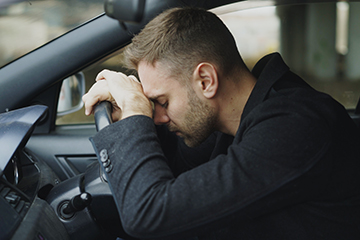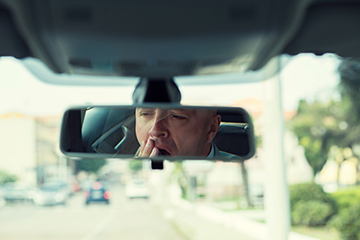Driver fatigue can be fatal

Many people don’t know or choose to ignore how much driving is too much. The biggest mistake you can make is not to rest when you’re tired. Determine how tired you are before you get behind the wheel. Recognise the early warning signs when driving and know what to do when you're tired.
Be aware of the causes, symptoms and possible dangers of driving while tired to save lives on our roads.
Driver Fatigue
Driver fatigue and tiredness are a danger on our roads. It affects anybody driving long distances, working long hours, is sleep deprived, stressed or ill. When you feel drowsy or have trouble keeping your eyes open on the road, it’s best to pull over to rest.
Although driver fatigue is associated with long-distance driving, it can also set in after a long day at work or a family outing. Fatigue-related crashes can happen on any trip, no matter how long or short and at any time of the day.
Factors that may cause driver fatigue include:
- working more than one job,
- working a night shift,
- driving after being awake for more than 15 hours,
- driving after sleeping less than 5 hours the night before,
- regular nighttime driving (especially between midnight and 6am),
- the use of medications that cause drowsiness, and
- driving for long periods or distances.
Look out for these 6 most telling signs of fatigue:
- You can’t keep your eyes open and struggle to stay focused.
- You yawn a lot and miss road signs and exits.
- You drift between lanes.
- You feel irritable and restless.
- You can’t keep your head up.
- You daydream and have disconnected thoughts.
Driver fatigue impairs your driving skills. The feeling of being tired or exhausted often results in difficulty moving your arms, legs and other muscles. It makes you less alert, affects your hand-eye coordination, and could result in you driving more recklessly.
Fatigue affects everyone and is one of the leading causes of motor vehicle accidents, particularly in long-distance freight, bus and taxi operations.

Follow these tips to prevent driver fatigue and arrive safely at your destination:
- Plan your journey well in advance.
- Don’t exhaust yourself the day before a long trip.
- Don’t drive during your body’s downtime (generally between 1am and 5am).
- Never use alcohol, drugs or medication that may cause drowsiness before your trip.
- Avoid sleeping tablets the night before you leave.
- Allow yourself to take short breaks along the way: a 15-minute stop-over at least every 2 hours or every 200 km.
- Get out and stretch your legs at a safe place along the road.
- Wear good quality sunglasses that won’t strain your eyes.
- Avoid eating big, heavy meals.
- Keep the temperature in the vehicle normal: If it’s too hot or too cold, it can make you feel even more tired.
- Make sure there are no leaking exhaust fumes.
- Rest when you aren’t driving.
If you fall asleep behind the wheel, you’re putting your own life (and that of others) in danger. If you’re getting tired, stop. Take a break, and be safe when you and your family are travelling.
We urge you to get enough rest before you start a journey and to be extra vigilant and mindful of all these factors at all times.
In the Western Cape, the following roads can potentially be dangerous if you drive while tired:
- the N1 highway between Laingsburg and Beaufort West,
- the R61 between Beaufort West and Aberdeen have been dubbed “roads of death” due to the high number of serious and fatal crashes that occur along these roads, and
- the R27 West Coast Road, which is also a hotspot for speeding.
Join Safely Home on Twitter @WCGovSafelyHome under the hashtag #SeeAndBeSeen
Driver Tiredness, Fatigue and Road Safety
Download and watch the Don’t Drive While Tired video clip.
For more information please visit Safely Home’s website for other road safety tips.


